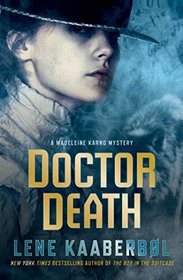Set in the 1890s France, Madeleine Karno is at the center of this mystery. Her father, Dr. Albert Karno, is a forensic doctor who has been asked to do a brief examination of the body of a young lady found dead at the door of her familys home. A mystery begins to unfold involving mites, hounds, a convent, and several more bodies.
I really enjoyed this book, though I did leave it having a few minor questions unanswered; I wished they had been wrapped up of a certainty in the epilogue. Nearly the entire story is told through Madeleines eyes, with a few letters and journal entries filling in the rest. Madeleine is a wonderful character to spend time with she has her own motives, pushes against societal norms in order to get to the truth, and isnt squeamish around blood. While France has started accepting women to universities, it is still highly unusual for a woman to be assisting in detective work or forensic examination.
The author does a very good job of mixing suspense, action, parasitology, 1890s medicine, and convent life in this mystery. I was never bored with this tale. There was family intrigue, convent intrigue, and then other bits and pieces that on the surface didnt seem connected. Indeed, we had more than one suspect for the murderer and with each body, the connections became harder to see. I really liked that this book kept me guessing until nearly the end.
There is some sex. One scene is described after the fact by one of the participants. It was a pretty robust scene. Then there is one character that has an embarrassing medical condition in which he gets a involuntary erection whenever he has any strong emotion, like social anxiety. There is also one body that is found in a rather compromising position. So, this book is not a cozy mystery or a light read. Be prepared to dig in and enjoy!
As much as I enjoyed this book, the tale left some questions unanswered at the end. Some of these are just follow up to minor characters of the what happened next? variety. For instance, I would like to know what happened with the father and brother of the first body. Other questions were related to solvig the mystery. Dont worry! We find out who did the deeds in the end. But I wanted to know more about how they were done. There are questions I have about how certain marks on Body #2 and I was unclear about the mite species.
Anyway, over all a decent read if you can let these smaller questions go unanswered. I still really enjoyed this book and will be looking up more of Kaaberbols work.
The Narration: Nicola Barber is one of my favorite narrators and she does not disappoint in this book. As usual, she had an excellent voice for our lead character, Madeleine, along with a lovely array of male and female voices for the rest of the cast.
I really enjoyed this book, though I did leave it having a few minor questions unanswered; I wished they had been wrapped up of a certainty in the epilogue. Nearly the entire story is told through Madeleines eyes, with a few letters and journal entries filling in the rest. Madeleine is a wonderful character to spend time with she has her own motives, pushes against societal norms in order to get to the truth, and isnt squeamish around blood. While France has started accepting women to universities, it is still highly unusual for a woman to be assisting in detective work or forensic examination.
The author does a very good job of mixing suspense, action, parasitology, 1890s medicine, and convent life in this mystery. I was never bored with this tale. There was family intrigue, convent intrigue, and then other bits and pieces that on the surface didnt seem connected. Indeed, we had more than one suspect for the murderer and with each body, the connections became harder to see. I really liked that this book kept me guessing until nearly the end.
There is some sex. One scene is described after the fact by one of the participants. It was a pretty robust scene. Then there is one character that has an embarrassing medical condition in which he gets a involuntary erection whenever he has any strong emotion, like social anxiety. There is also one body that is found in a rather compromising position. So, this book is not a cozy mystery or a light read. Be prepared to dig in and enjoy!
As much as I enjoyed this book, the tale left some questions unanswered at the end. Some of these are just follow up to minor characters of the what happened next? variety. For instance, I would like to know what happened with the father and brother of the first body. Other questions were related to solvig the mystery. Dont worry! We find out who did the deeds in the end. But I wanted to know more about how they were done. There are questions I have about how certain marks on Body #2 and I was unclear about the mite species.
Anyway, over all a decent read if you can let these smaller questions go unanswered. I still really enjoyed this book and will be looking up more of Kaaberbols work.
The Narration: Nicola Barber is one of my favorite narrators and she does not disappoint in this book. As usual, she had an excellent voice for our lead character, Madeleine, along with a lovely array of male and female voices for the rest of the cast.




